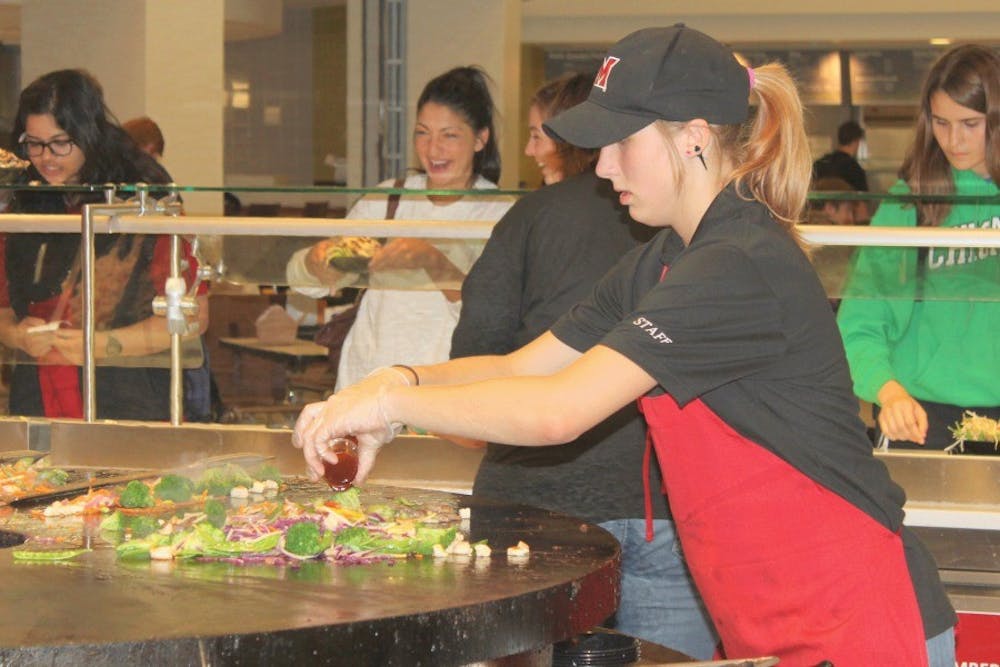By Bonnie Meibers, Senior Staff Writer
On Nov. 20, while at Western Dining Commons, first-year DK Dews grabbed and ate what he thought was a chocolate chip cookie.
Only after chewing and swallowing his first bite of the unlabeled cookie did he realize it was a peanut butter chocolate chip cookie.
"My throat started to itch really badly and it started to close up," he said.
Dews is severely allergic to peanuts - an allergy he has been told he will never grow out of.
Dews then called the Student Health Services Center, where he got a recorded message that then prompted him to call 911. While he was waiting for the ambulance to arrive, Dews injected himself with epinephrine through an EpiPen.
He was in the hospital for five hours.
"Patrons with food allergies can dine without worry at this location," according to Miami University's Dining website.
"Maybe if everything was labeled, I think that would be so important," Dews said. "I know that they do mostly, but sometimes there won't be a sign next to something or an old sign because something is not there anymore."
Steele Fitzwater is a sophomore. His allergies cover the gamut - wheat, barley, rye, eggs, peanuts, tree nuts, shellfish, peas, kiwi, cauliflower, peas, asparagus, broccoli, pineapple and bay leaves.
"I'm at Western probably two times a week," Fitzwater said. "The food they have is good, especially if you're looking for something healthy."
Junior Kyra Klonz also has extensive allergies. She is allergic to gluten, dairy, soy, nuts, apples, carrots, celery, oysters, clams, plums, corn and white potato.
Klonz said that she would often eat the same three meals every day of the week before she moved off campus.
"[Food allergies are] a matter of life and death for some students and we don't take that lightly," said manager of culinary support services, Mary Barrera.
Miami University's dining services has received a total of 52 awards since 2004. Many students choose to attend Miami because the university is willing to accommodate those with allergies and food sensitivities, according to Barrera.
The National Association of College and University Food Services (NACUFS) nationally ranked Western Dining Commons for its selection of allergenic, vegetarian and vegan foods. The dining hall is the only location on campus to offer a station solely for those with food allergies.
Fitzwater likes the allergenic station at Western because he can eat there without the worry of running into complications from eating food that has been cross contaminated or contains something he is allergic to.
"It is repetitive after a while, but you gotta do what you gotta do," Fitzwater said.
Barrera said all foods served at the allergen free station are prepared on dedicated equipment that has never been used to prepare foods with the top eight allergens or gluten.
The top eight allergens are dairy, eggs, peanuts, tree nuts, fish, shellfish, soy and wheat. The allergen-free station also caters to those who have a gluten sensitivity or intolerance.
The equipment at the allergen-free station is cleaned between uses and the dining staff is trained on the proper techniques to ensure food is prepared in a safe manner.
The point that Barrera says she and her staff stress to students is communication.
"We want students with a question about food to talk to us," she said. "The information students can gain from speaking with us is invaluable."
Miami Dining is willing to specially prepare food upon request for students with special dietary needs. For instance, Barrera said, at Mein Street in Armstrong Student Center, students can ask to have their stir fry made on a separate cooking area in an individual pan that is cleaned after each use, as opposed to the main grill that is only scraped after each use.
"If you reach out to them, they are willing to accommodate and more than happy to meet your needs to the best of their ability," Klonz said.
Overall, the dining experience for students with food allergies is positive.
"It would have been nice if [Miami] had a sign saying what the cookie was," Dews said. "But at the end of they day, I've been living with this food allergy for 18 years now and should've known better than to eat something that was that questionable."

